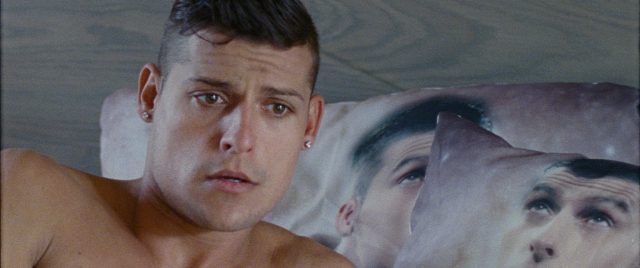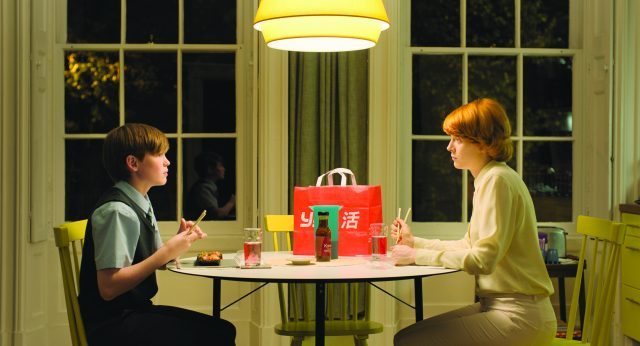
Giant fluffy puppies get in the way of a Portuguese soccer star’s dreams in Diamantino
DIAMANTINO (Daniel Schmidt & Gabriel Abrantes, 2018)
MoMA, Museum of Modern Art
11 West 53rd St. between Fifth & Sixth Aves.
Wednesday, January 1, 2:00
Series continues through January 8
www.moma.org
www.kinolorber.com
 The Museum of Modern Art’s annual “Contenders” series consists of films released over the past twelve months that the institution believes will stand the test of time, regardless of how much money it made at the box office or how many awards it might win. On New Year’s Day, MoMA is screening two under-the-radar gems to welcome in 2020. At 2:00 on January 1, you can catch a documentary, foreign-language picture, political thriller, high-tech crime chiller, comedy, romantic melodrama, fantasy and sci-fi, and more — all in one wildly entertaining film. Diamantino, Gabriel Abrantes and Daniel Schmidt’s full-length feature debut, is an absurdist multigenre mashup that is as tense as it is funny, an unpredictable romp that evokes Ernst Lubitsch, Howard Hawks, Michel Gondry, Philip K. Dick, South Park, Cinderella, James Bond, Being There, Minority Report, and Au Hasard Balthazar while feeling wholly original. Carloto Cotta stars as the title character, Diamantino Matamouros, a Portuguese soccer star à la Cristiano Ronaldo (pre-sexual assault allegations) who sees giant fluffy puppies when he is on the field. After botching a penalty kick in the World Cup Final, the stupendously beautiful star learns that his beloved father and mentor (Chico Chapas) has died. His evil twin sisters, Sónia (Anabela Moreira) and Natasha (Margarida Moreira), become his agents and make a secret deal with the mysterious Dr. Lamborghini (Carla Maciel) and a government minister (Silva Joana). Meanwhile, investigators Aisha Brito (Cleo Tavares) and Lucia (Vargas Maria Leite) — lovers who are soon to be married — are looking into Diamantino’s finances and devise a plan to get close to him by having Aisha pose as a male refugee named Rahim who Diamantino adopts as his son.
The Museum of Modern Art’s annual “Contenders” series consists of films released over the past twelve months that the institution believes will stand the test of time, regardless of how much money it made at the box office or how many awards it might win. On New Year’s Day, MoMA is screening two under-the-radar gems to welcome in 2020. At 2:00 on January 1, you can catch a documentary, foreign-language picture, political thriller, high-tech crime chiller, comedy, romantic melodrama, fantasy and sci-fi, and more — all in one wildly entertaining film. Diamantino, Gabriel Abrantes and Daniel Schmidt’s full-length feature debut, is an absurdist multigenre mashup that is as tense as it is funny, an unpredictable romp that evokes Ernst Lubitsch, Howard Hawks, Michel Gondry, Philip K. Dick, South Park, Cinderella, James Bond, Being There, Minority Report, and Au Hasard Balthazar while feeling wholly original. Carloto Cotta stars as the title character, Diamantino Matamouros, a Portuguese soccer star à la Cristiano Ronaldo (pre-sexual assault allegations) who sees giant fluffy puppies when he is on the field. After botching a penalty kick in the World Cup Final, the stupendously beautiful star learns that his beloved father and mentor (Chico Chapas) has died. His evil twin sisters, Sónia (Anabela Moreira) and Natasha (Margarida Moreira), become his agents and make a secret deal with the mysterious Dr. Lamborghini (Carla Maciel) and a government minister (Silva Joana). Meanwhile, investigators Aisha Brito (Cleo Tavares) and Lucia (Vargas Maria Leite) — lovers who are soon to be married — are looking into Diamantino’s finances and devise a plan to get close to him by having Aisha pose as a male refugee named Rahim who Diamantino adopts as his son.

Diamantino Matamouros (Carloto Cotta) is surrounded by images of himself in Gabriel Abrantes and Daniel Schmidt’s dazzling feature debut
Everyone except his sisters, who know better, thinks he is some kind of genius mastermind, but Diamantino is actually an addled simpleton who understands very little about life. He enjoyed playing soccer, likes eating Nutella and whipped cream sandwiches, and, following his tearful retirement, hangs out with his cat, Mittens, and dedicates himself to raising Rahim, who he does not realize is actually a grown woman. He’s reminiscent of Chance the Gardener (Peter Sellers) in Being There, but his airheaded statements — which are outrageously funny — are seldom mistaken for brilliance, except when he’s manipulated into making fascistic political statements he doesn’t understand. Winner of the Grand Jury Prize at Cannes Critics’ Week, Diamantino is stunningly photographed by Charles Ackley Anderson, who quickly adapts the film’s visual style as it switches from fantasy to love story to futuristic thriller, with numerous memorable shots, including Lucia in a white nun’s habit on a motorbike, Diamantino and Rahim sleeping on pillows with large images of the soccer star’s head, and a huge fluffy puppy playing goal in the championship game. American-born directors and longtime collaborators Abrantes and Schmidt, who edited the film with Raphaëlle Martin-Holger, show a deep love and respect for movies, infusing Diamantino with charm and energy, humor and compassion, honoring, in their own way, the history of cinema. The rest of the cast and crew do their part as well, from art director Bruno Duarte and composers Ulysse Klotz and Adriana Holtz to the Moreira sisters and multidisciplinary Portuguese star Manuela Moura Guedes as television interviewer Gisele.

Alice Woodard (Emily Beecham) surveys her creation in Jessica Hausner’s Little Joe
LITTLE JOE (Jessica Hausner, 2019)
Wednesday, January 1, 5:00
www.littlejoefilm.com
 Emily Beecham was named Best Actress at Cannes for her role as a scientist and single mother who creates a different kind of monster in Jessica Hausner’s tense and gripping Little Joe, screening at MoMA at 5:00 on January 1. The Austrian director’s first English-language film was inspired directly by Frankenstein and Invasion of the Body Snatchers while evoking elements of Rosemary’s Baby and Little Shop of Horrors as it plays with horror, sci-fi, teen drama, and other genre conventions. Beecham is Alice Woodard, a plant breeder who is developing a flower she believes can make people happy through its “mood-lifting, antidepressant” scent. She names the new species Little Joe, after her son, Joe (Kit Connor), and even sneaks one plant home for him from the highly secured lab, which is blatantly against the rules.
Emily Beecham was named Best Actress at Cannes for her role as a scientist and single mother who creates a different kind of monster in Jessica Hausner’s tense and gripping Little Joe, screening at MoMA at 5:00 on January 1. The Austrian director’s first English-language film was inspired directly by Frankenstein and Invasion of the Body Snatchers while evoking elements of Rosemary’s Baby and Little Shop of Horrors as it plays with horror, sci-fi, teen drama, and other genre conventions. Beecham is Alice Woodard, a plant breeder who is developing a flower she believes can make people happy through its “mood-lifting, antidepressant” scent. She names the new species Little Joe, after her son, Joe (Kit Connor), and even sneaks one plant home for him from the highly secured lab, which is blatantly against the rules.
She works at a science institute — a pristine environment with sterile-looking halls and researchers walking around in white lab coats — with Chris (Ben Whishaw), who has a crush on her, Bella (Kerry Fox), who goes everywhere with her dog, assistants Ric (Phénix Brossard) and Jasper (Andrew Rajan), and their boss, Karl (David Wilmot), who is hesitant to release the plant to the public until rigorous testing proves its safety, even though there’s an important plant show coming up where it would be perfect to introduce it. But after the lovely red blooms start emitting clouds of white spores, first Bella’s dog, then Alice’s coworkers and son, along with his friend Selma (Jessie-Mae Alonzo), begin changing.

Joe (Kit Connor) and his mother, Alice (Emily Beecham), sit down for takeout in stylized, atmospheric Little Joe
Written by Hausner (Lourdes, Amour Fou) with Géraldine Bajard, Little Joe is thick with foreboding, as scenes play out slowly to creepy electronic music by late Japanese composer Teiji Ito, who scored films by Maya Deren. The film is set in a timeless world of brightly lit, vividly contrasting pastel yellows, reds, greens, pinks, purples, and blues that conjure the 1970s but there are cell phones; cinematographer Martin Gschlacht, editor Karina Ressler, costume designer Tanja Hausner (the director’s sister), and production designer Katharina Wöppermann invoke the atmosphere of such cult faves as auteurs John Carpenter and David Cronenberg and novelist Ira Levin — who wrote The Stepford Wives, The Boys from Brazil, and Rosemary’s Baby — as Alice soon finds herself fighting against what appears to be a spreading conspiracy, all the while exploring her fears with her understanding psychotherapist (Lindsay Duncan). Alice’s bowl-cut red hair is reminiscent of Mia Farrow’s in Rosemary’s Baby (and her last name, Woodard, is similar to Rosemary’s, Woodhouse). Like that classic horror film, Little Joe focuses on the concept of birth and parenthood from a female point of view; even as Alice tries to protect her scientific creation, she is attempting to hold on to her pubescent son as he and his father, Ivan (Sebastian Hulk), become closer. “The ability to reproduce is what gives every living being meaning,” Bella says.
Perhaps the scariest part of the film is how realistic it feels despite its heavily stylized artifice. Hausner consulted with neuroscientist James Fallon, biologist Hanns Hatt, and other experts to research the validity of her plot, particularly in an age where there is global controversy over the efficacy of genetically modified food and animal and human cloning. Beecham (Sulphur and White, Into the Badlands) is superb as Alice, a stand-in for all of us, someone who just wants to bring happiness to the world but, in this case, may not fully understand the price it comes with. “The Contenders 2019” continues through January 8 with such other recent favorites as Uncut Gems, followed by a discussion with directors Benny and Josh Safdie; Sam Mendes’s WWI drama 1917; and Melina Matsoukas’s Queen and Slim.